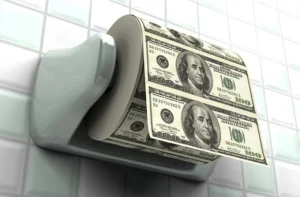Life Throws Curveballs
Okay, story time… I’ll start with the embarrassing one. Back when I thought budgeting was just for “old people,” I spent most of my twenties living dangerously close to zero. (That thrill when you check your bank balance praying your rent didn’t hit yet? Yeah… not recommended!)
Then, my car died… in the middle of a January blizzard… on the way to an interview I really needed. Cue panic mode. My checking account was bone-dry, no emergency fund in sight. My only option? Credit card. That one moment—it’s burned in my memory—changed the way I thought about savings forever.
Why am I telling you this? Because the true power of an emergency fund isn’t found in those textbook “rules.” It’s in those real moments, when life does what it does best… and you realize you need a soft landing.
Not All Emergencies Are Created Equal
Is It Really an Emergency?
Let’s rip the band-aid off: Not everything that feels urgent actually deserves a withdrawal from your emergency fund. You might be wondering—”which of the following would be considered an emergency fund expense?” Let’s walk through it together.
First, think of your emergency stash as a financial fire extinguisher: only to be cracked open for genuine, smoke-filled chaos. Lost your job? Yup. Sudden, necessary home repair? Absolutely. Your dog swallows your earbuds (again)? Also yes. But those concert tickets that “just went on sale”? Not so much.
Real-Life Test: Table of True vs. False Emergencies
| Scenario | Emergency Fund? | Why or Why Not? |
|---|---|---|
| Surprise medical bill | Yes | Unpredictable, urgent, can’t be postponed research on spending habits. |
| Major car repair (to keep your car running) | Yes | Needed for work/life, not easily avoided. |
| Routine dental cleaning | No | Predictable, should be in your regular budget. |
| Vacations or holiday gifts | No | Fun, but totally not an emergency finance writing. |
| Lost job/unemployment | Yes | Status quo disrupted, income stopped—emergency! |
| Leaky roof during a storm | Yes | Urgent repair to prevent more damage. |
| New cell phone just because “mine’s old” | No | Want, not need—save up for it separately. |
Here’s a little mantra: If it’s unexpected, essential, and needs fixing right now—or else—your emergency fund has your back. If not? It’s probably just your FOMO talking.
Nitty-Gritty of Budgeting for Emergencies
What Counts… and What Doesn’t?
So… which of the following would be considered an emergency fund expense? Let’s list a few right out:
- Out-of-nowhere medical bills
- Car repairs that keep you going to work
- Sudden, urgent home repairs (burst pipe, storm damage)
- Emergency vet visits for your pet
- Unemployment or loss of steady income
Not on the list? Birthday gifts. Annual fees you knew were coming. That gym membership you forgot to cancel. (Been there… multiple times.)
If you’re still scratching your head, it helps to ask yourself: “Can I honestly say this expense is urgent and impossible to plan for?” If you’re waffling, take a peek at which of the following questions helps you determine if something is actually an emergency expense?.
Personal Pause Button: Ask Yourself
Quick gut check: If you make a late credit payment, you might see the lender add all sorts of fees—and that snowball turns into an avalanche. So, tapping your emergency fund might make sense if skipping payment would make things way worse.
But if you’re just tempted by a sale or want to treat yourself… try sleeping on it before touching your hard-earned safety net.
Wait… How Big Should My Fund Even Be?
The 3-6 Month Debate
Here’s where people freeze up. You Google, “How much emergency fund do I need” and see “save 6-8 months of expenses!” … and you want to slam your laptop closed.
Calm down. It’s about progress, not perfection. Start small. A lot of folks (myself included) start with $500 or $1,000—enough to cover life’s most common fire drills. Over time, as life and responsibilities grow, aim for 3–6 months of bare-bones expenses (think: rent, groceries, health insurance… not the daily cold brew).
Simple breakdown: add up what you absolutely must pay each month—housing, food, utilities, transport, minimum loan payments. Multiply by 3–6. That’s your long-term “security number.”
Let’s Get Real: Example Time
When I started, I could barely stash $200 a month. I set up an online savings. (Not glamorous, but hey, it worked.) Did I get discouraged? Absolutely. The urge to “borrow” from the pile never really goes away.
But the first time my hot water heater croaked, I covered it in cash—no credit cards, zero stress. I almost did a little happy dance in the middle of Home Depot.
Boost Your Fund, The Frugal Way
Small Habits, Big Impact
Now, let’s get scrappy. Building your fund doesn’t have to be a grind. (Okay, maybe it is at first, but trust me, it gets easier.)
- Set up automatic transfers, even if it’s just $20 a paycheck. Out of sight, out of mind… out of temptation!
- Trim a few small habits: bringing lunch, skipping the latte line—those $5 wins add up, swear.
- Any windfalls? Tax return, birthday money, random refunds—toss ’em in the fund.
Feeling ambitious? Side hustle cash is golden for this. One summer, I dog-sat every weekend and padded my emergency stash faster than expected. Not glamorous… but it felt downright heroic come October when my car insurance bill hit.
Frugal Fixes Table
| Habit Shift | How Much Saved (monthly) | Where It Goes |
|---|---|---|
| Meal prepping instead of takeout | $150 | Emergency fund + groceries |
| Cancelling unused subscriptions | $30 | Direct deposit to savings |
| Weekend dog sitting | $80–$200 | Side hustle straight to fund |
Every little bit is worth it. For extra firepower? Think about “rate of return” is a phrase used to describe what aspect of investing? when choosing where to park your emergency fund (hint: high-yield savings > shoebox under your bed).
Emergencies: No Guilt Zone
Splash of Reality
Let’s be honest, sometimes you’ll have to dip into your emergency fund for those “ughhh, I wish this wasn’t happening” moments. Using it is not failure—it’s the whole point. The key: refill it as soon as you can, so you’re ready for the next surprise life lobs your way.
Don’t let fear of “doing it wrong” stop you from even starting. We all slip up. (Been there, many times.) If you’re unsure, remember to check in with which of the following questions helps you determine if something is actually an emergency expense?. If you’re still not sure, ask a trusted friend (or… drop a comment below, and let’s talk it out together).
There’s this thing called “financial peace of mind.” Sounds cheesy, but it’s just knowing that when the next curveball hits—because it will—you’ll be ready. Honestly, that’s half the motivation for saving in the first place.
If you need more reasons to get in the habit, check out The three reasons to save money are. It’s all about giving your future self a helping hand (trust me, you’ll thank yourself!).
Let’s Bring It Home
Whew, that was a lot. So here’s the bottom line: which of the following would be considered an emergency fund expense? It’s those unpredictable, urgent moments—car repair, job loss, medical bills, leaking roof—that matter most. Not the “ooh, this is on sale” moments. Not routine or planned stuff. If you remember nothing else, remember that.
Emergency funds aren’t about perfection—they’re about progress. One dollar at a time. Celebrate every little win. Build the habit. Give yourself permission to mess up and start again.
Remember, why is it important to make an emergency fund your first financial priority? isn’t just about money—it’s about peace of mind and not letting life’s rough patches knock you flat. Next time life throws a wrench at you, you’ll be standing on steady ground, not scrambling for a quick fix.
So… right now—before the next unexpected bill lands—what can you do? Even transferring $10 to a savings account counts. Or maybe print out that “emergency or not?” chart and stick it on your fridge for future-you. Whatever your next step is, I’m rooting for you. Seriously. And if you have any wild “how my emergency fund saved my bacon” stories, share them. We’re in this together.
And if you ever find yourself stalling, remember—the three reasons to save money are still waiting for you. One’s for emergencies. The others? Well… you’ll just have to peek in and find out.













